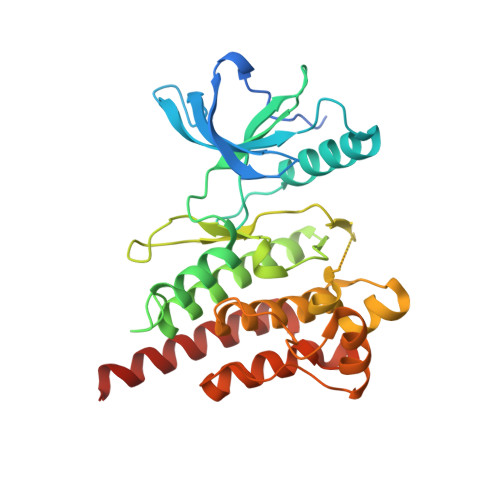Acquired Resistance to Crizotinib from a Mutation in Cd74-Ros1
Awad, M.M., Katayama, R., Mctigue, M., Liu, W., Deng, Y., Brooun, A., Friboulet, L., Huang, D., Falk, M.D., Timofeevski, S., Wilner, K.D., Lockerman, E.L., Khan, T.M., Mahmood, S., Gainor, J.F., Digumarthy, S.R., Stone, J.R., Mino-Kenudson, M., Christensen, J.G., Iafrate, J., Engelman, J.A., Shaw, A.T.(2013) N Engl J Med 368: 2395
- PubMed: 23724914
- DOI: https://doi.org/10.1056/NEJMoa1215530
- Primary Citation of Related Structures:
3ZBF - PubMed Abstract:
Crizotinib, an inhibitor of anaplastic lymphoma kinase (ALK), has also recently shown efficacy in the treatment of lung cancers with ROS1 translocations. Resistance to crizotinib developed in a patient with metastatic lung adenocarcinoma harboring a CD74-ROS1 rearrangement who had initially shown a dramatic response to treatment. We performed a biopsy of a resistant tumor and identified an acquired mutation leading to a glycine-to-arginine substitution at codon 2032 in the ROS1 kinase domain. Although this mutation does not lie at the gatekeeper residue, it confers resistance to ROS1 kinase inhibition through steric interference with drug binding. The same resistance mutation was observed at all the metastatic sites that were examined at autopsy, suggesting that this mutation was an early event in the clonal evolution of resistance. (Funded by Pfizer and others; ClinicalTrials.gov number, NCT00585195.).
- Department of Medicine, Massachusetts General Hospital Cancer Center, Boston, MA 02114, USA.
Organizational Affiliation:

















